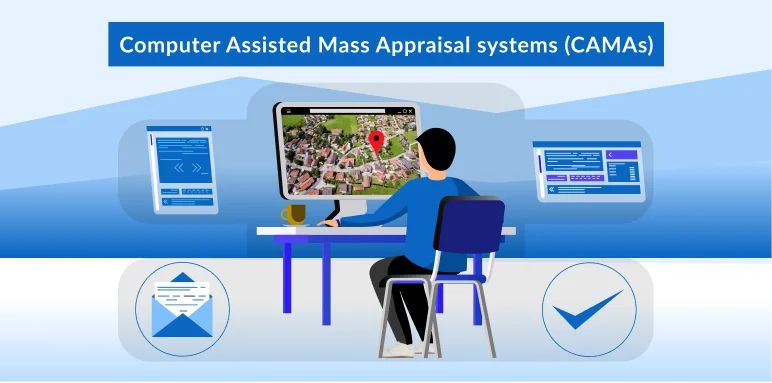February 05, 2021
The ABCs of Computer Assisted Mass Appraisal systems (CAMAs)
A cyclic real property appraisal is a legal requirement in the USA. The central government has very less to do with the process. In America, real property appraisal is undertaken by every county's respective appraisal district and is overseen by assessors.
What is mass appraisal?
Property values are affected by a number of qualitative and quantitative factors. This ranges from the property, ownership, size, location, use, physical characteristics, sales price, rents, costs, and operating expenses among other things.
Individual analyses and appraisals of properties are not practical for ad valorem tax purposes. While each property is unique, the need for a property value system that offers uniformity, accuracy, effectiveness, cost and time efficiency, but also mass use capabilities, led to the development of mass appraisals.
Mass appraisal is the process of valuing a group of properties as of a given date and using common data, standardized methods, and statistical testing to determine a market value for assessment purposes. It is the systematic assessment of the value of a set of homogenous properties, on a given date, by using standardized procedures.
What is CAMAs?
Computer Assisted Mass Appraisal systems (CAMAs) or automated valuation models are automated systems used for information management related to properties, valuations, owners’ notifications and the security of taxation credibility through uniform valuation procedures. CAMAs are used to streamline the usage of limited resources and complete the valuation process in time. Further, automated valuation models achieve objectivity and uniformity, especially when the number of properties is large.
Automated mass appraisals techniques should satisfy a two-fold need:
- Achieve a satisfactory level of predictive capability and accuracy.
- Offer an acceptable justification for the predicted property values.
Computer programs apply market-derived land rates depending on neighborhood and property type, building costs and depreciation factors calibrated to local market conditions using sales data, building style, grade of construction, and building condition.
What data is collected?
Relevant land, improvement and location features are required for Computer Assisted Mass Appraisal generation. CAMA systems also store and process relevant sales, cost, and income and expense data.
Geographic data
Cadastral maps (also known as assessment maps, tax maps, parcel boundary maps, and property ownership maps) covering the entire jurisdiction with a unique identification number for each parcel must be maintained with up-to-date, accurate data. The maps are useful when Geographic Information Systems (GIS) are used by assessors.
GIS displays sale prices, assessed values, inspection dates, work assignments, land uses in addition to high-level analysis of nearby sales, neighborhoods, and market trends.
Property Characteristics data
Property characteristics are essential for classification, valuation, and other purposes. The collected data is based on:
- Factors that influence the market in the locale.
- Offer an acceptable justification for the predicted property values.
- Requirements of classification and property tax policy.
- Requirements of other governmental and private users.
- Marginal benefits and costs of collecting and maintaining each property characteristic.
Learn more about property characteristics data collection, maintenance and usage here.
Sale data
Sale data is required for several approaches used to determine mass appraisals. It helps develop land values, market-based depreciation schedules, and in the derivation of capitalization rates or discount rates to be used in various methods.
Income and expense data
This data is to be mandatorily collected for income-producing property. Qualified appraisers are also required to review this data to ensure their accuracy and usability for valuation analysis.
Cost and depreciation data
Current cost and depreciation data adjusted to the local market are required. Current cost is the cost of replacing a structure with one of equal utility, using current materials, design, and building standards. It must also include the cost of individual construction components and building items in order to adjust for features that differ from base specifications. Land value and accrued depreciation must be based on non-cost data and can involve considerable subjectivity. Often, land values are extracted from sales of improved property. Depreciation schedules can be extracted from sales data in several ways.
Learn more about property valuation models and how data is used for the purpose here.
If you are looking to file a property tax appraisal protest in Texas, learn more here.

Disclaimer
Articles presented here are for general information and education only. It is provided as a courtesy to the general public. SQD Taxtech LLC does not warrant that it is accurate or complete. Opinions expressed and estimates or projections given are those of the authors or persons quoted as of the date of the article with no obligation to update or notify of inaccuracy or change. This article may not be reproduced, distributed or further published by any person without the written consent of SQD Taxtech LLC. Please cite source when quoting.
SQD Taxtech LLC, its managed affiliates and subsidiaries, as a matter of policy, do not give tax, accounting, regulatory or legal advice. Rules in the areas of law, tax, and accounting are subject to change and open to varying interpretations. You should consult with your other advisors on the tax, accounting and legal implications of actions you may take based on any strategies presented, taking into account your own particular circumstances.